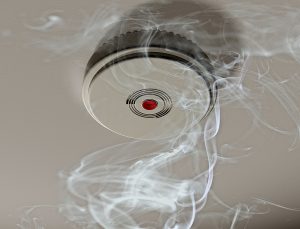Smoke Detector Buying Guide
Monday, October 25th, 2021

A smoke detector is a device that detects smoke, typically as an indicator of fire. Commercial security devices issue a signal to a fire alarm control panel as part of a fire alarm system, while household detectors often issue their own signals directly. Here is everything you need to know about purchasing a smoke detector for your business.
Some smoke detectors are also linked to carbon monoxide sensors and might be combo devices containing both smoke and CO sensors. Smoke detectors are often required in dwellings by building, local, or national safety regulations.
It is good practice to test smoke detectors at least monthly using the device’s test button. If you remove batteries from smoke detectors for any length of time, reset the units once batteries are re-installed (ideally within 7 days).
Types of smoke detectors
There are two types of smoke detectors: photoelectric and ionization chambers.
Photoelectric units contain a light source that radiates out across the room looking for smoke particles to reflect off of.
Photoelectric units are more expensive, but they are less prone to nuisance alarm activations than ionization chamber units.
Ionization chamber units have a small amount of radioactive material inside the device to detect smoke particles in the air. This makes them extremely sensitive to small amounts of smoke, which may result in many false alarms.
A heat detector uses a sensor that detects elevated temperatures. When the air surrounding the sensing element reaches a certain temperature, the element expands and conducts electricity differently. This closes an electrical circuit that triggers a warning signal or alarm from either a built-in auditory device or external speakers for security purposes.
Heat detectors are used as standalone devices as part of fire alarm systems, as well as fire detection devices for smoke detectors.
The main causes of fires in businesses are:
1) Smoking materials such as cigarettes, cigars, etc. thrown into combustible waste or other materials
2) Faulty machinery or equipment
3) Electrical wiring – either overloaded circuits or poor maintenance can cause problems with the electrical system;
4) Flammable or combustible liquids used in business, such as paint thinning solvents and other types of storage.
5) Building issues – For example, a lack of fire extinguishers, sprinkler systems, or alarms can cause unnecessary problems.
Smoke detector requirements
Smoke detectors are required by code in new construction and must be installed outside of each high traffic area in the immediate vicinity of separate offices. Interconnecting these alarms with the fire alarm is a great way to save lives and protect employees from dangerous conditions.
The NFPA recommends that at a minimum, smoke detectors should be installed on every level of a business, including basements. In most cases, centrally located hallways are a good place for detectors. Some buildings have step detection detectors that have both heat and smoke sensors. These are typically installed in high-ceiling areas or the attic, where the potential for fire is greater.
New Federal Regulations require all smoke detectors manufactured for sale within the United States after January 1, 2007, to be listed by an acceptable accredited laboratory (e.g., Underwriters Laboratories (UL), Factory Mutual (FM), Canadian Standards Association (CSA)). Independent standards organizations test and certify smoke detectors so customers know the detector will perform as expected.
Contact Vitel Communications for your smoke detector needs!
Vitel Communications specializes in the installation of smoke detectors for businesses. It’s important that you stay up to date with the latest technology so that you can keep your employees and your business safe. Send us a message to learn more about how we can help you!


